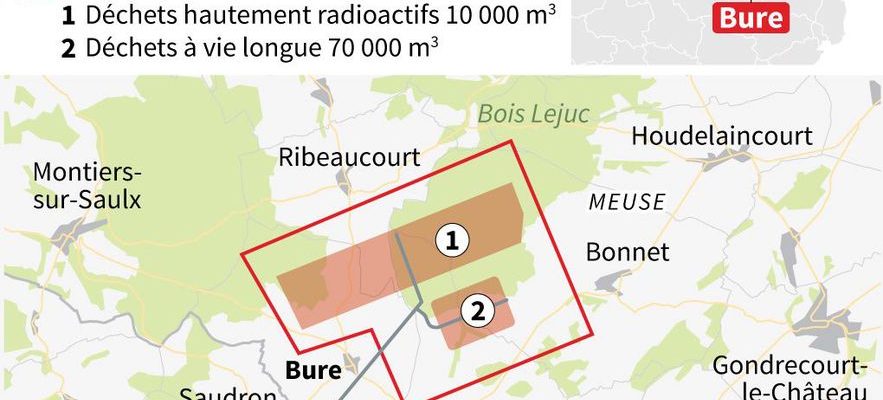It was a long-awaited decision by the Sages. The provisions of the Cigéo center project for the burial of the most radioactive waste in Bure (Meuse) “do not disregard” the rights of future generations “taking into account (the) guarantees” provided, judged, Friday October 27, the Constitutional Council which affirms for the first time this intertemporal dimension of environmental protection.
Three years after ruling that environmental protection does not stop at borders, the Wise Men go further, with this new decision, by affirming “in unprecedented terms” that “the legislator must ensure that the choices intended to meet the needs of the present do not compromise the ability of future generations and other peoples to meet their own needs.
Location map of the future nuclear waste site of Bure, in the Meuse
© / afp.com/Sophie RAMIS
A project consistent with the Constitution
Concerning the Cigéo project for burial 500 meters underground, contested for more than 20 years by local residents, anti-nuclear collectives and associations, the Constitutional Council examined, step by step, the process provided for by law and the locks placed to ensure in particular the reversibility for at least 100 years of the methods of this geological storage.
He concludes that “taking into account these guarantees, the contested provisions do not disregard the requirements of Article 1 of the Environmental Charter (…)” and he “therefore declares them to be in conformity with the Constitution”, according to her decision.
The commissioning authorization, the examination of which has just begun and which must last three years, will be limited to a pilot phase “which must make it possible to reinforce the reversible nature and the demonstration of safety of the installation, in particular by a in situ test program”, underlines the Constitutional Council. “All waste packages must remain readily recoverable during this phase, which includes recovery trials,” he says. As for the permanent closure of the site in the longer term, only a law can authorize it, he notes.
The declaration of public utility of the project granted by the government in 2022 was attacked before the Council of State by 14 local and seven national organizations such as Attac, France Nature Environnement, Greenpeace or even “Sortir du nuclear”, as well as local residents . This appeal was an opportunity to ask a Priority Question of Constitutionality (QPC) to verify whether the method of waste treatment planned in the clayey subsoil of Bure respects the constitutional principles, namely those laid down by the Charter of the environment of 2005.
“Storage reversibility”
In terms of landfilling waste, the principle imposed by French texts is to ensure the reversibility of the storage method, for at least several decades during which it is necessary to be able to change method or recover the waste. However, the applicants argued, the considerable period of time, up to hundreds of thousands of years, during which the most toxic waste must be preserved before radiation falls to safe levels far exceeds this duration, and jeopardizes the right future generations.
The decision of the Constitutional Council was eagerly awaited in the midst of the relaunch of the atom desired by the executive, to produce more electricity and replace other energies, which emit greenhouse gases.
Opponents of the project invoked the rights of future generations. They criticized Cigéo “for not guaranteeing the reversibility of storage (…) beyond a period of one hundred years, thus preventing future generations from being able to reconsider this choice while the irremediable damage to the environment, and in particular water resources, could compromise their ability to meet their needs.
France has three surface storage centers, two in Aube and one in Manche, which make it possible to store 90% of the radioactive waste produced in the territory.
A double technical examination
The most radioactive nuclear waste, those with high intensity and long life, could be stored by 2035-2040 in the clayey subsoil of Bure, on the borders of the Meuse and Haute-Marne. The site could accommodate at least 83,000 m3, like the Finnish Onkalo depot, designed to house spent fuel from the five national reactors.
Like every nuclear site, Cigéo will be subject to a double technical examination by the Nuclear Safety Authority (ASN) and the IRSN, the Institute which monitors nuclear risk, which will take around three years. For the moment, the Andra Meuse site only hosts a scientific laboratory; no radioactive waste is stored there.
The project has sparked numerous episodes of protest. On September 2, a demonstration took place again under close surveillance and brought together several hundred people, local residents but also anti-nuclear activists of different nationalities (French, Germans, Swiss, Brazilians, Colombians) who came to denounce the “forceful passage” of the state.
